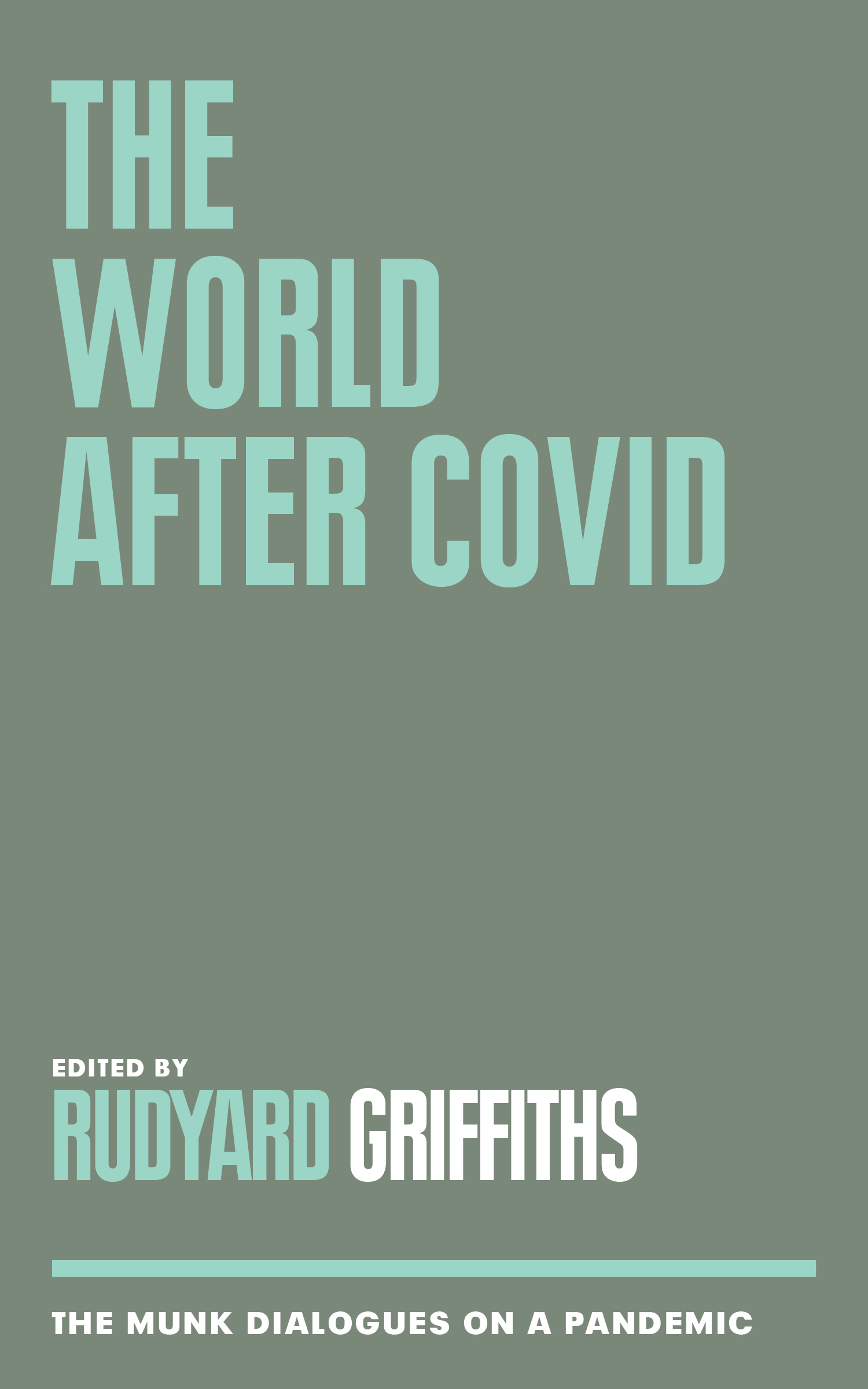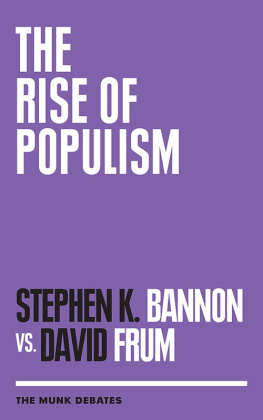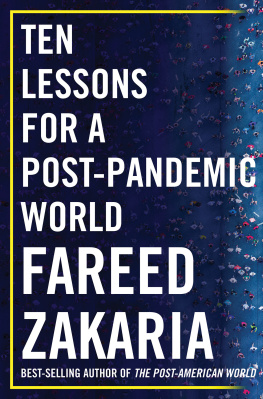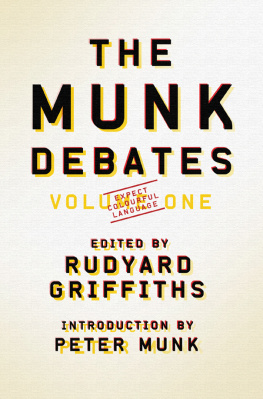The World After COVID

A Letter from Peter Munk
Since we started the Munk Debates charity, my wife, Melanie, and I have been deeply gratified at how quickly they have captured the publics imagination. From the time of our first event in May 2008, we have hosted what I believe are some of the most exciting public policy debates in Canada and internationally. Global in focus, the Munk Debates have tackled a range of issues, such as humanitarian intervention, the effectiveness of foreign aid, the threat of global warming, religions impact on geopolitics, the rise of China, and the decline of Europe. These compelling topics have served as intellectual and ethical grist for some of the worlds most important thinkers and doers, from Henry Kissinger to Tony Blair, Christopher Hitchens to Paul Krugman, Peter Mandelson to Fareed Zakaria. They have also led to an active book publication program with Anansi, a lively online presence, and countless discussions and dialogues between our presenters, our members, and the millions of people interacting with our charity every year.
The issues we have explored over the last decade have not only fostered public awareness but have also helped many of us become more familiar and, therefore, less intimidated by the concept of globalization. It is so easy to be inward-looking. It is so easy to be xenophobic. It is so easy to be nationalistic. It is hard to go into the unknown. Globalization, and our fast-changing world, for many people, is an abstract concept at best. One of the purposes of our foundation and its work is to help people feel more able to engage in a global dialogue about the issues and events that will shape our collective future.
I dont need to tell you that there are many, many burning issues. Global warming, the plight of extreme poverty, genocide, our shaky financial order: these are just a few of the critical issues that matter to people. And it seems to me, and to my foundation board members, that the quality of the public dialogue on these vital issues diminishes in direct proportion to the salience and number clamouring for our attention. By trying to highlight the most important issues at crucial moments in the global conversation, we seek not only to profile the ideas and opinions of some of the worlds brightest thinkers for your benefit but also advance the broad public knowledge necessary to tackle some of the key challenges confronting humankind today.
I have learned in life and Im sure many of you will share this view that challenges bring out the best in us. I hope youll agree that the topics and ideas explored in our debates, online programing and book publications encourage us, individually and collectively, to think clearly and logically about important problems facing our world to our universal benefit.
Peter Munk (19272018)
Founder, The Aurea Foundation
Toronto, Ontario
The World after COVID
The Munk Dialogues on a Pandemic
Edited by Rudyard Griffiths
Copyright 2021 Aurea Foundation
Published in Canada in 2021 and the USA in 2021 by House of Anansi Press Inc.
www.houseofanansi.com
All rights reserved. No part of this publication may be reproduced or transmitted in any form or by any means, electronic or mechanical, including photocopying, recording, or any information storage and retrieval system, without permission in writing from the publisher.
House of Anansi Press is a Global Certified Accessible (GCA by Benetech) publisher. The ebook version of this book meets stringent accessibility standards and is available to students and readers with print disabilities.
Series design: Alysia Shewchuk
Cover design: Ricky Lima
Typesetting: Matthew Chan
Transcription: Rev
House of Anansi Press respectfully acknowledges that the land on which we operate is the Traditional Territory of many Nations, including the Anishinabeg, the Wendat, and the Haudenosaunee. It is also the Treaty Lands of the Mississaugas of the Credit.
We acknowledge for their financial support of our publishing program the Canada Council for the Arts, the Ontario Arts Council, and the Government of Canada.
Contents
The first series of the Munk Dialogues were held between April 9 and June 10, 2020. The information in this book reflects what was known at the time of the conversations.
Malcolm Gladwell in Conversation with Rudyard Griffiths
April 9, 2020
RUDYARD GRIFFITHS: Hello, and welcome to the Munk Dialogues, a project of the Aurea Foundation and the Peter Munk and Melanie Munk Charitable Foundation. These dialogues are an attempt to hold a series of conversations about what the world will look like after COVID-19. In this series, leading thinkers will come together to encourage all of us to begin to think about this experience that were having together right now. What does it mean for our society? What does it mean for our politics? What does it mean for international relations and the state of our world? How will this change us?
This week, we have a person whom we consider one of the most versatile and creative thinkers of our time. Please welcome Malcolm Gladwell to the Munk Dialogues. Malcolm, great to have you on the program.
MALCOLM GLADWELL: Thank you, Rudyard. Its my pleasure.
RUDYARD GRIFFITHS: Lets start by pressure-testing you with what I think is the big question we want to explore in these dialogues, which is, Whats going to be fundamentally different, in your view, between the pre and postCOVID crisis worlds? Specifically, what do you think will be the biggest impact on our society, the biggest change that will occur in the post-COVID reality that were all going to inherit?
MALCOLM GLADWELL: I guess first I have to ask whether you want the best-case scenario or the worst-case scenario. First, let me take a stab at the best-case scenario and ask what we can learn from this experience. I think there is a really crucial lesson here. As is always the case with me, explaining this lesson will require a little bit of a detour.
For the longest time I have been fascinated by an observation that was made by these two economists, Chris Anderson and David Sally, who wrote a book about soccer. They were trying to answer a basic question about soccer: How do you make a soccer team better, by upgrading its best players or its worst players? They found that the answer isnt even close: you need to upgrade the worst players, because soccer is a weak-link sport and your team is only as good as its weakest member. In soccer, one bad player means a botched pass, and everyones efforts in the field end up going to waste.
That is in stark contrast to basketball, which is a strong-link sport. If you want to make a basketball team better, you bring in Kawhi Leonard. You bring in a superstar. And I think for the longest time in Western societies, we have been playing a strong-link game. Weve tried to become better by improving our strongest links. If you think about a country like Canada in the nineteenth century or the first half of the twentieth century, you can see it was playing a strong-link game. It was building some elite universities and strong central institutions to create a core of very well educated, middle-aged white guys to run things.







